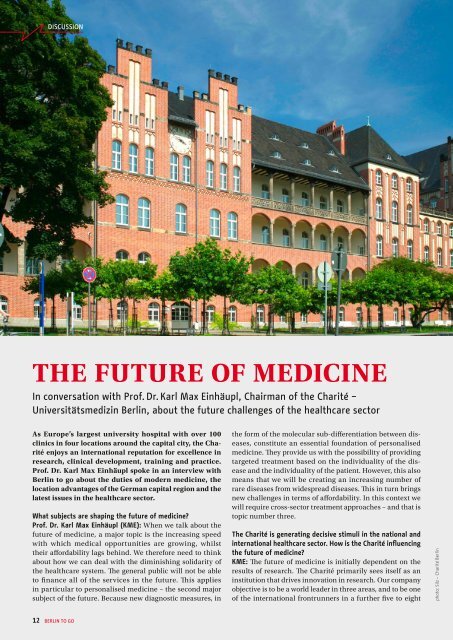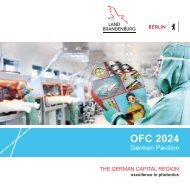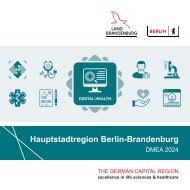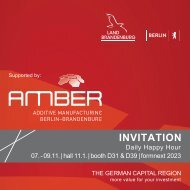Berlin to go, english edition 2/2015
You also want an ePaper? Increase the reach of your titles
YUMPU automatically turns print PDFs into web optimized ePapers that Google loves.
DISCUSSION<br />
THE FUTURE OF MEDICINE<br />
In conversation with Prof. Dr. Karl Max Einhäupl, Chairman of the Charité –<br />
Universitätsmedizin <strong>Berlin</strong>, about the future challenges of the healthcare sec<strong>to</strong>r<br />
As Europe’s largest university hospital with over 100<br />
clinics in four locations around the capital city, the Charité<br />
enjoys an international reputation for excellence in<br />
research, clinical development, training and practice.<br />
Prof. Dr. Karl Max Einhäupl spoke in an interview with<br />
<strong>Berlin</strong> <strong>to</strong> <strong>go</strong> about the duties of modern medicine, the<br />
location advantages of the German capital region and the<br />
la test issues in the healthcare sec<strong>to</strong>r.<br />
What subjects are shaping the future of medicine?<br />
Prof. Dr. Karl Max Einhäupl (KME): When we talk about the<br />
future of medicine, a major <strong>to</strong>pic is the increasing speed<br />
with which medical opportunities are growing, whilst<br />
their affordability lags behind. We therefore need <strong>to</strong> think<br />
about how we can deal with the diminishing solidarity of<br />
the healthcare system. The general public will not be able<br />
<strong>to</strong> finance all of the services in the future. This applies<br />
in par ticular <strong>to</strong> personalised medicine – the second major<br />
subject of the future. Because new diagnostic measures, in<br />
the form of the molecular sub-differentiation between diseases,<br />
constitute an essential foundation of personalised<br />
medicine. They provide us with the possibility of providing<br />
targeted treatment based on the individuality of the disease<br />
and the individuality of the patient. However, this also<br />
means that we will be creating an increasing number of<br />
rare diseases from widespread diseases. This in turn brings<br />
new challenges in terms of affordability. In this context we<br />
will require cross-sec<strong>to</strong>r treatment approaches – and that is<br />
<strong>to</strong>pic number three.<br />
The Charité is generating decisive stimuli in the national and<br />
international healthcare sec<strong>to</strong>r. How is the Charité influencing<br />
the future of medicine?<br />
KME: The future of medicine is initially dependent on the<br />
results of research. The Charité primarily sees itself as an<br />
institution that drives innovation in research. Our company<br />
objective is <strong>to</strong> be a world leader in three areas, and <strong>to</strong> be one<br />
of the international frontrunners in a further five <strong>to</strong> eight<br />
pho<strong>to</strong>: Silz – Charité <strong>Berlin</strong><br />
12 BERLIN TO GO

















